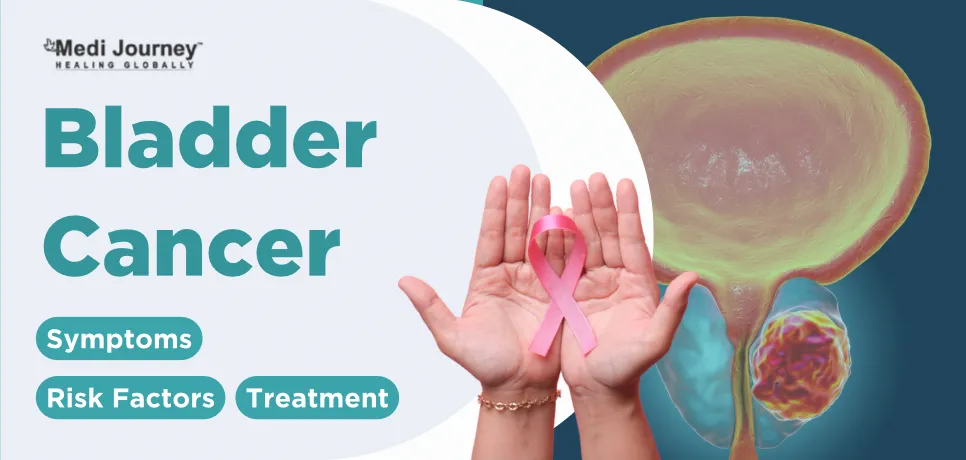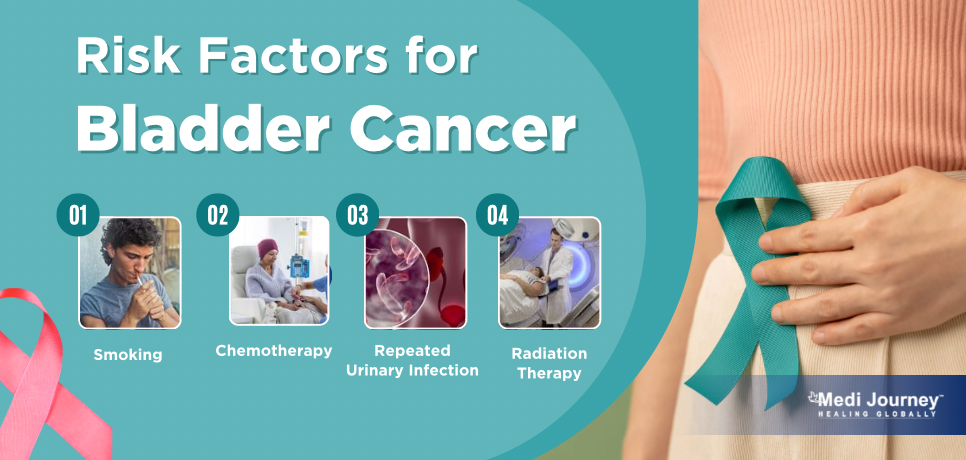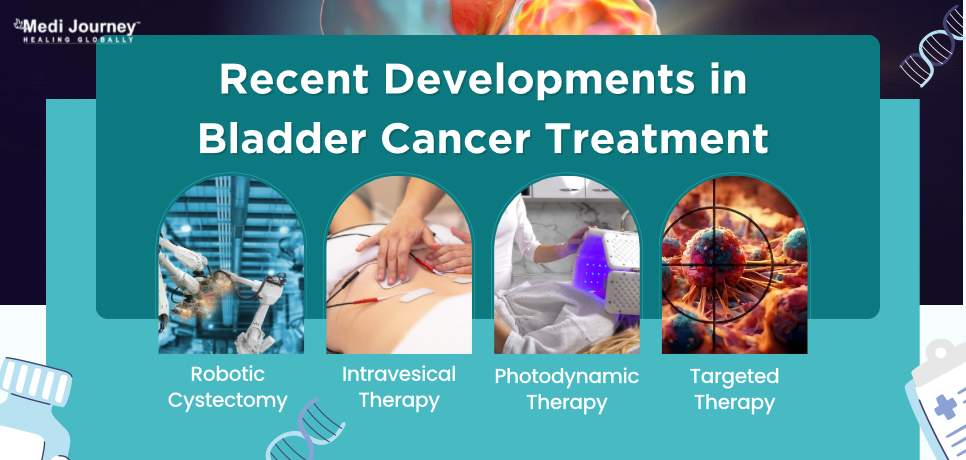Best Orthopedic Surgeons in Artemis Hospital Gurgaon
 17 December,2025
Read More
17 December,2025
Read More
Enquire now in case of any assistance needed

Bladder cancer has become one of the most dreadful diseases in modern times. Statistics show that over 600,000 new cases were diagnosed in 2022, making it the 9th most common cancer worldwide. In the same year, over 220,000 people lost their lives due to the disease.
Early diagnosis is the key to a successful bladder cancer treatment. Spreading awareness about regular screening can help reduce the number of people scrambling to bladder cancer annually.
Bladder cancer may not be the most talked-about cancer, but it's essential to be informed. This blog post sheds light on bladder cancer, its symptoms, and risk factors so you can take control of your health.
Fill up the form and get assured assitance within 24 hrs!
The bladder is a hollow organ that acts as a reservoir for urine. When the cells in the organ start to divide unorganizedly, a cluster of cells (tumor) is formed. This condition is what we call bladder cancer.
Bladder cancer is classified into different types based on the type of cell that transforms into cancer. The following are the three types of bladder cancer based on cell type:
Bladder cancer is also classified based on location. The two types of bladder cancer based on location are:
Bladder cancer affects hundreds of thousands worldwide. Everyone wonders why cancer is such a deadly disease. Well, cancer can be just like any other non-fatal disease if it is diagnosed and treated in an early stage. However, since most cancers do not show any distinguishing characteristics initially, it becomes difficult to detect them. Hence, regular screening is vital for people who are at an added risk of developing cancer.
Being aware of the symptoms is vital for early detection. Some common symptoms that the bladder cancer show are –
Experiencing any of these symptoms doesn't necessarily mean you have bladder cancer. Other conditions can cause similar symptoms. However, it's crucial to consult an oncologist for proper diagnosis and rule out serious health concerns.

Bladder cancer occurs when there are genetic changes in the cells of the bladder. The exact reason for these mutations is unknown. However, oncologists associate multiple risk factors with bladder cancer. These are –
Cancer is a frightening diagnosis, especially when it reaches advanced stages. But the good news is that many bladder cancers can be effectively treated if caught early. Regular screenings are crucial for high-risk individuals.
Diagnostic tests that help diagnose bladder cancer are –
Your oncologist will decide the best treatment approach based on the stage and type of bladder cancer. Non-muscle-invasive bladder cancer can be managed by chemotherapy, TURBT surgery, and immunotherapy. For muscle-invasive bladder cancer, the treatment plan includes chemotherapy, immunotherapy, surgery (cystectomy), radiation therapy, or trimodal therapy.
Different types of surgeries are available to treat bladder cancer. Your surgical oncologist will choose the appropriate type of surgery based on your cancer stage, overall health, and individual needs.
Cancer drugs are often the first treatment used to fight cancer. For bladder cancer, there are two ways to receive chemotherapy: Intravesical Chemotherapy and Systemic Chemotherapy.
Have you heard of X-rays? Well, radiation oncologists can use X-rays to treat bladder cancer, too.
Immunotherapy is a biological therapy that has emerged as a breakthrough in cancer treatment. It utilizes the body's immune system to fight cancer. The therapy is designed to boost the immune system's ability to identify, recognize, and kill cancer cells. It can be administered in two ways: intravesical immunotherapy and systemic immunotherapy.

Bladder cancer research is taking place in various medical institutions and hospitals worldwide. Every year, scientists are discovering more about the causes of the disease, how to detect it early, and how to treat it more effectively.
With the help of advancements in cancer treatment, the death rate for bladder cancer has been decreasing. Studies reported a decline of over 2% annually from 2016 to 2020.
Oncologists measure the success of cancer treatment in terms of survival rate. Bladder cancer has a 5-year relative survival rate that determines the percentage of people who survive for five years after being diagnosed with the same type and stage of bladder cancer compared to the general population.
5-year survival rates for bladder cancer are -
It is evident through data that the chances of successful treatment and survival are higher when the cancer is localized and not metastasized. Hence, it is essential for people who are at risk of developing bladder cancer to get regularly screened. When diagnosed in the early stages, the chances of survival are as high as 97%.
Early diagnosis is crucial for successful cancer treatment. Failure to treat cancer in a timely manner can lead to fatal outcomes. Bladder cancer treatment is decided based on the stage and type of the disease. Generally, a combination of radiation, chemotherapy, and surgery is recommended for managing bladder cancer. Oncologists also use advanced techniques like immunotherapy and targeted therapy to achieve better results
Fill up the form and get assured assitance within 24 hrs!
Doctor of Pharmacy
Dr. Deepanshu Siwach is a skilled clinical pharmacist with a Doctor of Pharmacy degree.?He has 4+?years of experience and has worked with thousands of patients. He has been associated with some of the top hospitals, such as Artemis Gurgaon.
Dr. Vivek Gupta is an experienced Surgical Oncologist with over 16 years of practice....
Senior Consultant
Medical Oncologist
Nanavati Super Specialty Hospital, Mumbai
WhatsApp UsSenior Director
Gynecologist and Obstetrician, IVF Specialist
Max Super Speciality Hospital, Shalimar Bagh, New Delhi
WhatsApp UsSenior Director
Gynecologist and Obstetrician, IVF Specialist
Max Smart Super Speciality Hospital, Saket, New Delhi
WhatsApp UsSenior Director
Gynecologist and Obstetrician
Max Smart Super Speciality Hospital, Saket, New Delhi
WhatsApp UsSenior Director
Gynecologist and Obstetrician
Max Smart Super Speciality Hospital, Saket, New Delhi
WhatsApp UsSenior Director
Gynecologist and Obstetrician
Max Smart Super Speciality Hospital, Saket, New Delhi
WhatsApp UsThe Art of Effective Communication
 17 December,2025
Read More
17 December,2025
Read More
 16 December,2025
Read More
16 December,2025
Read More
 10 December,2025
Read More
10 December,2025
Read More
 09 December,2025
Read More
09 December,2025
Read More
 05 December,2025
Read More
05 December,2025
Read More
 04 December,2025
Read More
04 December,2025
Read More
Trusted by Patients
"I am Asim from Bangladesh and was looking for treatment in India for neuro. I visited many websites to get the complete information regarding the treatment but I was not satisfied as I was getting confused. In the meanwhile, one of my friends suggested I seek help from Medi Journey as he experienced his medical journey very smoothly and was satisfied with it. They have filtered the top 10 doctors as per experience, the success rate of surgery & profile, so it helps us to choose the best treatment in India. "
"For my knee surgery, Medi Journey guided me to BLK Hospital where I received exceptional care. The team's support and the expertise at BLK Hospital exceeded my expectations. Thank you Medi Journey for making my medical journey stress-free. "
"I came from Iraq for my granddaughter's eye surgery in India facilitated by Medi Journey, due to critical cases they advised us to get a second opinion from the different hospitals before going to surgery. Finally, we went to Fortis Escort Hospital, which helped us to get more confidence for diagnosis. Fortis Escort Hospital has the best eye surgeon team with the latest instruments. Thanks to all team members for providing a high-quality treatment in India at an affordable cost. "
"I came for my hair transplant in India, before coming I was so confused about choosing the best clinic and surgeon for me. But thanks to God one of my friends had a hair transplant in India through Medi Journey. He recommended me to go with them. I am completely happy with my experience with them. They were always very fast in their responses to me. the success rate of my hair transplant surgery is 100%."
"Artemis Hospital, suggested by Medi Journey, turned out to be a great choice for my treatment. The personalized assistance and medical care were exceptional. I'm grateful to Medi Journey for guiding me to a hospital that perfectly matched my needs. Highly recommended! "
"I came from Afghanistan for my treatment in India at Jaypee Hospital, Noida. I had a fantastic experience with Medi Journey. Kudos to them for their incredible support during my medical journey. They not only took care of all the logistics but also connected me with a fantastic healthcare team. Efficient, caring, and highly recommended for a hassle-free medical tourism experience."
"I am Adam from Kano, Nigeria, one of my friends from Nigeria was facilitated by Medi Journey, and he recommended us to go with them. I sent my all reports to them and within 48 hours they reverted with 4 options from different hospitals. They helped me to get a Visa letter from the hospital, arrange pick-up from the airport, and book a hotel for me. Their team is very honest and throughout our stay in India they are with us they are caring for us like his family members. BLK Hospital is the best hospital in India with a top surgical oncologist surgeon team, a very advanced OT, and a Radiotherapy department. I wish more success to Medi Journey. "
"Great experience at the Max Hospital for my spine surgery and was successfully done. I thank my neurosurgeon and his entire team. I recommended all of my country's people to Medi Journey for treatment in India, they choose the best hospital, the best doctors, and the best cost for patients."
"I came to India from Dhaka, Bangladesh for my father-in-law's cardiac surgery at Fortis Hospital. I was confused about choosing the best surgeon for him before coming, but their team helped me to choose the best hospital and best cardiac surgeon in India with very good cost and 100% success rate of surgery. I am very happy with the services, really they make my journey so comfortable that make me feel at home. Thanks again and I like people to choose "Medi Journey" as your travel guide. "
"I am Mohammad from Bangladesh came to India for my general health checkup. Medi Journey offers me the complete package including Pick-up from the airport, hotel services, and 24-hour assistance. They guide you to choose the best hospital in India, the best cost of treatment with top-most doctors and give you complete information about hotel booking, and pick-up from the airport before coming to India They have the best team to help. Always choose Medi Journey for your treatment in India."





